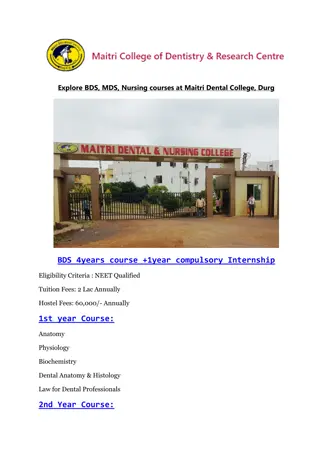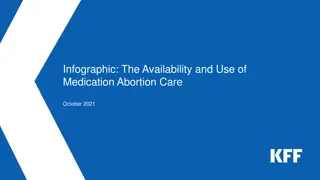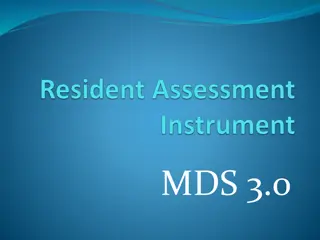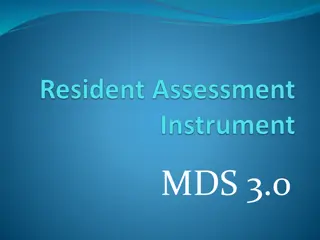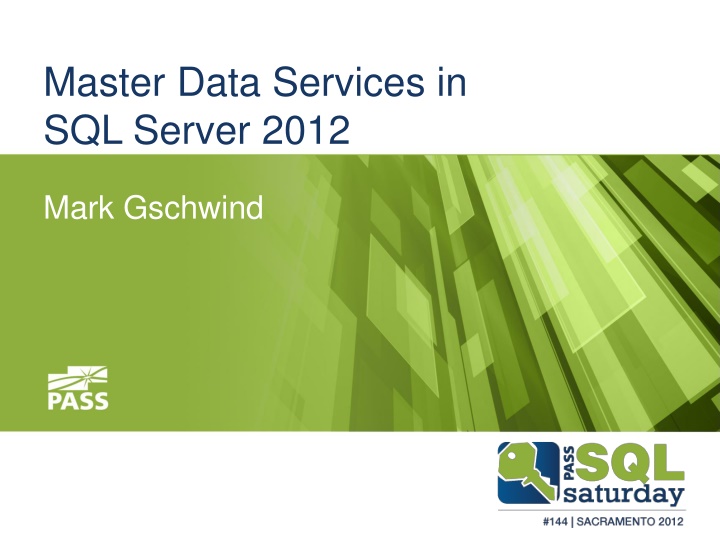
Master Data Services in SQL Server 2012 Overview
Discover the importance of Master Data Services in SQL Server 2012 with Mark Gschwind. Learn about managing master data, data warehousing scenarios, and the role of MDS in business intelligence projects. Explore the capabilities of SQL 2012 MDS and how it empowers business users in maintaining and curating essential data objects.
Download Presentation

Please find below an Image/Link to download the presentation.
The content on the website is provided AS IS for your information and personal use only. It may not be sold, licensed, or shared on other websites without obtaining consent from the author. If you encounter any issues during the download, it is possible that the publisher has removed the file from their server.
You are allowed to download the files provided on this website for personal or commercial use, subject to the condition that they are used lawfully. All files are the property of their respective owners.
The content on the website is provided AS IS for your information and personal use only. It may not be sold, licensed, or shared on other websites without obtaining consent from the author.
E N D
Presentation Transcript
Master Data Services in SQL Server 2012 Mark Gschwind
Agenda What is Master Data? Why is it important? Overview of SQL 2012 MDS Capabilities Underlying Architecture Demo 1. Creating a model 2. Using the new Excel interface 3. Creating a hierarchy 4. Exposing MDS data to the DW 5. Using business rules Case Study Tips on successful implementations
Mark Gschwind Independent Consultant Business Intelligence practitioner, manager since 1995 Over 50 Business BI projects Data Warehousing/Cubing/Reporting/Data Mining/EIM MCP, certified in Oracle Essbase, Melissa Data MVP Working with clients on EIM since 2008 mark@gschwindconsulting.com find me on www.linkedin.com/in/markgschwind Blog Site: www.marksbiblog.com
What is Master Data? Master Data is the set of data objects that are at the center of business activities (Customers, Products, Cost Centers, Locations ) requiring Centralized maintenance (or curation) Continuous quality management Ease of access for business users (not just IT) Effective sharing (producing and consuming) Master Data contains different attributes for different departments (marketing, finance, operations, business groups ) MDS enables users to curate Master Data. This capability can be powerful in a number of scenarios across an organization.
Main Scenarios Data Warehouse/ Data Marts Mgmt Data Management Solutions Enable business users to manage the dimensions and hierarchies of DW / Data Marts Provides storage and management of the objects and metadata used as the application knowledge BI scenarios Object mappings Reference Data / managed object lists The IT department has built a data warehouse and reporting platform, but business users need more agility in making updates. MDS empowers the business users to manage dimensions themselves while IT can govern the changes Table containing information on mapping objects Metadata management / data dictionary between different systems. ETL processes are referencing the table making transformation decisions. Canonical form Product Name System A System B Product ID MDS enables business users to manage the objects mapping Color Size ID Name Price ID Name
Where is Master Data (in a DW)? Here Here Here
MDS Capabilities Validation Modeling Entities, Attributes, Hierarchies Authoring business rules to ensure data correctness Master Data Stewardship Data Matching (DQS Integrated) Role-based Security and Transaction Annotation Excel Add- In Web UI Versioning Enabling Integration & Sharing Loading batched data through Staging Tables Registering to changes through APIs Consuming data through Views Workflow / Notifications External (CRM, ..) DWH Excel
MDS Architecture WEB-UI Excel Add-In Silverlight WCF BizTalk / Others Workflow / Notifications MDS Service CRM/ERP IIS Service DWH SSIS BI OLAP SSIS Cleansing and Matching (DQS) Excel Subscription Views Entity Based Staging Tables PW Pivot MDS Database SSIS External System External System
Business Rules Business Rules are expressions and actions that can govern the conduct of business processes Enable data governance by: -- Enforcing data standards -- Alerting users to data quality issues -- Creating simple workflows Have limitations, but can be extended to SharePoint
Security Functional area permissions Model/Entity level permissions provide column- level security Hierarchy permissions allow row-level security Use AD groups, not individual users Only use Hierarchy permissions if row-level security is required
Managing MDS Environments Use MDS Configuration Manager to create a Dev website and DB Use web UI to deploy model structure only Use MDSModelDeploy.exe to deploy model+data To package an existing model MDSModelDeploy createpackage -package customer_en.pkg -model "Customer" -service "MDS1 -includedata To deploy an existing package MDSModelDeploy deploynew -package customer_en.pkg -model "Customer" -service "MDS2 To deploy an update MDSModelDeploy deployupdate package customer_en.pkg version VERSION_1 -service "MDS2
MDS Tips Start small and build incrementally Create and use a development environment Engage the business users and get them to own the process
Additional Resources Suzanne Selhorn s site: http://www.mdsuser.com/ MSDEV on YouTube http://www.msdev.com/Directory/SeriesDescr iption.aspx?CourseId=155 Microsoft SQL Server 2012 Master Data Services 2/E MSDN: http://msdn.microsoft.com/library/ee633763 %28SQL.110%29.aspx Forum: http://social.msdn.microsoft.com/Forums/en/ sqlmds/threads
SQL Saturday #144 After Party Sponsored by at Light food and drinks will be served!! 6PM to ? 1369 Garden Highway Sacramento, CA Phone: 916-649-0390






